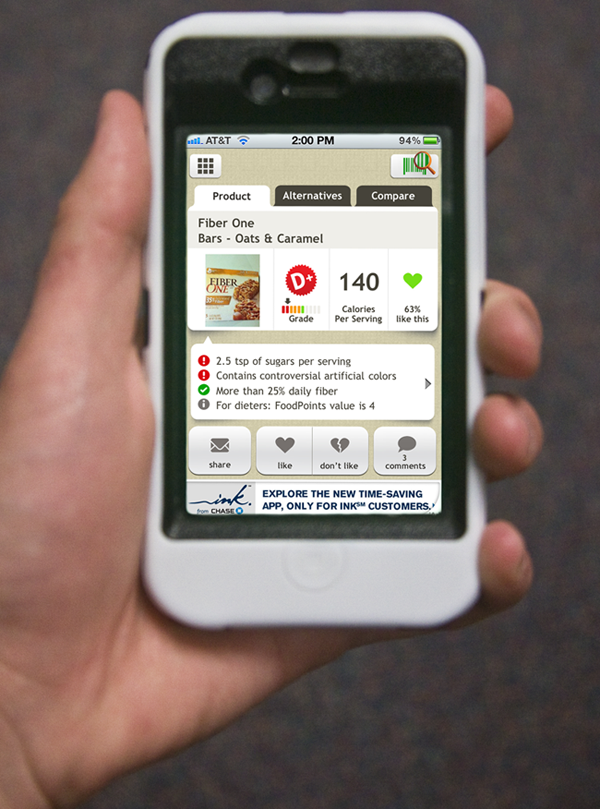
Fooducate provides nutritional information immediately to your phone. (Photo illustration by Spencer J Eggers/The Daily Campus)
You’re late for class and you want to grab something healthy on your way out the door.
Preparing anything will take too long so you open your cabinet and grab a Special K cereal bar.
Healthy, right?
Wrong, at least according to the new iPhone application Fooducate.
Fooducate is an app created by Hemi Weingarten, a high technology executive and father of three who found it difficult to make rational decisions about what to feed his family.
Weingarten decided to do a little research on health and nutrition and he, along with a team of parents, dieticians and technologists, created a take anywhere, personal grocery advisor for people and their families.
The application allows people to scan the barcode of a product and then shows them its food grade, the number of calories and the percentage of people who like the item.
Fooducate tells people what is misleading about the product and lets them see alternate choices as well as compare their item with another item they may want.
It lets people see the information manufacturers don’t want them to notice.
“We want people to make food choices based on full disclosure,” Weingarten said. “The more people know, the better food they will eat, the more the food industry will make an effort to improve.”
The fooducate system is graded on a system that looks at the products’ nutrients, ingredients, category and processing.
The lowest grade a product can receive is a D, and the highest is an A.
That Special K bar mentioned earlier received a D on the Fooducate app.
The app advises consumers that the bar contains trans-fats, even if the label says zero; it is not 100 percent whole grain; there are 2.5 teaspoons of sugars per serving; and only a tiny amount of real fruit.
When asked to see some alternate products the app lists a Strawberry Crunch PowerBar as a much better option, a B+ on the grade list, even with its 240 calories per serving.
Shelley Smyth, a nutritionist and consultant at Medi Weightloss Clinic, has not used the app herself but read about it the other day and is interested to see what all it can do.
“I think if [Fooducate] can be accurate it would be awesome, but I think it would be difficult for something like that to be 100 percent accurate,” she said.
College students, especially freshmen who are away from home for the first time, may find it difficult to pick out packaged foods that contain the best nutrition.
Fooducate is a way to help people choose items that are healthy, and provide better options for their favorite, not so healthy, items.
“I think [Fooducate] would be really helpful,” Catherine Leslie, a freshman at SMU, said. “For me I would probably use it for foods, like boxed foods, or if I had a sweet tooth I would use it on foods that are not as good for me to find the best one.”
The Fooducate website has a blog that posts information daily on new nutrition imposters and other nutritional news.
The blog was designed to provide people with tips and tricks to help make anyone a better shopper of nutritional food.
Fooducate was created to help people learn the truth about food products and Weingarten says that he has received a lot of positive feedback.
“People can’t believe that their cereal is 40 percent sugar by weight, or that their mac n’ cheese is colored with yellow number five, a synthetic carcinogenic dye,” he said. “It opens their eyes to what’s really in their food.”
The app was originally created for the iPhone, but now works on the iPod touch, iPad and Android OS version 2.2 and up.
The application is not funded by any food manufacturers, supplement companies, diets or any other diet pills.
For more information on Fooducate visit its website and blog at www.fooducate.com.








